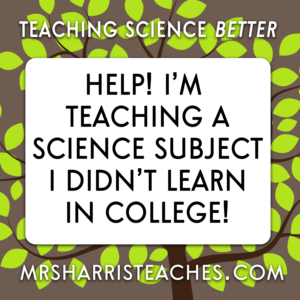What it Means to Be Teaching Out of Field (OOF) and What to Do About It
To sum it up, most science teachers are teaching subjects they were not trained in college to teach (a.k.a teaching out of field), but there are many internet and book resources out there to help.

Many science teachers with 5 years of experience or less are teaching subjects in which they have not been prepared. This is called out-of-field (OOF) teaching. In fact, one study found only 36% of high school science teachers – with five years of experience or less – are teaching the subject they’re qualified to instruct. I like how the acronym sounds like how I feel about this truth – seriously, oof!
The truth is OOF teaching applies to most science teachers, elementary teachers teaching science, and homeschool parents.
As a science teacher, I can relate. Although my undergraduate degree is in Biology, I have mainly taught Earth Science, Physical Science, and Physics. In fact, I only taught in my subject area (AP Biology) once! It was about 10 years after I graduated from college, so it might as well have been OOF teaching because I had to relearn a LOT of information!
So, what do you do if you are an elementary teacher with little science training, a high school science teacher teaching in a subject outside your expertise, or a parent trying to keep up with your child’s varied science interests? The short answer is, you LEARN.
As a teacher and parent, I know this is easier said than done. With my minimal time, these are the resources that I found most helpful. If you are teaching out of field, these resources can help you too:
Textbooks and Review Books
First and foremost, I recommend buying several (yes, 3-5!) textbooks related to the subject you are teaching. This recommend holds even if you are an elementary or middle school teacher! This sounds expensive, but I promise you can buy older editions for $10 or less that will save you a lot of time and effort.
In my experience, many school districts are not providing any textbooks. This was true in my case. As my district moved to 1-to-1 with digital devices, it became more and more clear that the 10 year old textbooks were not going to be replaced. The push was to use free open source digital textbooks like CK-12, WikiBooks, and OER Commons. These free resources are good, but you need some books you can pull off your shelf.
Look for popular textbooks for your subject and snag a teacher edition if you can. Also, look for a community college textbook related to your course. Even if the information is higher than your grade level, this is the best way for you to build your subject knowledge. Community college textbooks tend to be advanced, but on a level accessible for any college graduate.
For example, here are some books I reference for my Earth/Environmental Science courses:
- Environment: The Science Behind the Stories
- Foundations of Earth Science
- Earth Science: Geology, the Environment, and the Universe, Teacher Edition
- Environmental Science For Dummies
- Geology for Dummies
Videos – YouTube Science Channels and Science Documentaries on Streaming
Here’s a list of 10 great science channels for elementary and middle school science teachers to follow (and honestly, these channels are great for high school science teachers too!). In addition to that list, I suggest the Amoeba Sisters (Biology), Bozeman Science (Biology, Physics, Chemistry), Science with Susanna (Anatomy & Physiology), Earth Unplugged (Earth Science), Minute Physics (You guessed it, Physics!), and Periodic Videos (Chemistry). Also, watch as many documentaries related to your content as you can stand. These will help you find cool connections to make your class interesting. Here are top science documentaries for Netflix, Hulu, HBO, and Amazon Prime Video.
Trade Books
I am going to be adding round-ups of great science trade books specific to different subjects. In the meantime, both your school librarian and public librarian are your friend. Really, let them know what you need. They can even pull all the books for you so all you have to do is pick up all your books. Take notes and photocopy favorite pages or use Camscanner to save important pages digitally.
Internet
Gah, there are too many sources to share in this post, so I will stick to my top two:
- If you are not a member of NSTA, I’d suggest joining to gain access to a wealth of quality science teacher resources. They also have plenty of science freebies and classroom resources if a membership isn’t an option.
- Science Friday is always inspiring to me. Listen here!
The resources I shared above all have a focus on content. Study after study has shown the importance of teachers knowing science content deeply (beyond what students are required to learn) so they can teach science better. Best of luck!
What strategies do you have for learning new science content? What are your go-to sources for science information? Please share, we all need to help one another!
On Another Note: Do not overlook the obvious. If you are teaching out of field, talk to your colleagues and administration. See if you can switch classes! If it is possible to switch who is teaching certain classes, taking out of field classes out of your teaching load may be an easy solution!

P.S If you are looking for ideas for science experiments, check out my book Real Science Experiments: 40 Exciting STEAM Activities for Kids online at Amazon, Barnes&Noble, Indigo (for those of you in Canada), and even Target!


Leave a Reply